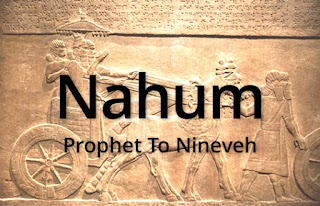God is merciful, not wishing for anybody to be lost, but there comes a point when His patience runs out and His wrath is revealed.
(Please start by reading Jonah 3)
Nineveh in the 8th century BC had all the trappings of a great city. Capital of the vast and successful Assyrian empire, cosmopolitan and cultured, boasting a grand library and sophisticated learning and living. Palaces and gardens and ingenious water supplies via aqueducts and canals, all was secure and content. But there was a dark side to all this opulence, as the success of the empire was based on systematic cruelty, brutalising every nation they conquered with ever more ingenious means of torture. It is thought that these were the people who invented the hideous custom of crucifixion so as to extend the suffering of vast numbers of their victims. Terror was state policy, and mass deportation the means of keeping whole people groups in subjection.
Source: Mission Venture Ministries
The prophet Nahum, some 150 years after Jonah, cried out in Nahum 3:1 ‘Woe to the bloody city, all full of lies and plunder – no end to the prey!’. Nahum, the only other prophet from northern Israel, predicts in graphic detail the final retribution and destruction of this tyrannical people at the hands of the Babylonians and Medes; Nahum 3:7 ‘Wasted is Nineveh; who will grieve for her? Where shall I seek comforters for you?’ He even predicted the means of conquest and the colour of the invaders’ uniforms.
So why did God send Jonah to Nineveh and why did God go to such extraordinary lengths to make sure he got there with a simple five-word call to repentance? In the following years did God change His mind? What can we learn about the nature of God’s mercy and God’s judgement? The opening verses of Nahum are clear; Nahum 1-3 ‘This is a prophecy about Nineveh, the book of the vision of Nachum the Elkoshi: Adonai is a jealous and vengeful God. Adonai avenges; he knows how to be angry. Adonai takes vengeance on his foes and stores up wrath for his enemies. Adonai is slow to anger, but great in power; and he does not leave the guilty unpunished’. (Jewish Bible)
So, the Lord is slow to anger, but that does not mean He lets people off. An analogy might be the pan of milk on the stove which superheats but does not boil, but suddenly there is a point at which it boils over and cannot be stopped. God is merciful, not wishing for anybody to be lost, but there comes a point when His patience runs out and His wrath is revealed. God’s wrath was simmering against Nineveh, and He sent Jonah. The citizens repented and the overturning was delayed. Years later God’s wrath boiled over, and it was too late. Nahum was sent to tell them that time was up and in Nahum 1:6 ‘His wrath is poured out like fire.’ Within a few years, impossible though it seemed, that was the end of the great city, which still today lies in abandoned ruins on the outskirts of Mosul in Iraq.
Source: Never Thirsty
We have much to learn from these Old Testament prophets, whose message is reiterated in the New Testament; 2 Peter 3:9-10 ‘The Lord is not slow to fulfil his promise as some count slowness, but is patient towards you, not wishing that any should perish, but that all should reach repentance. But the day of the Lord will come…’
So, was Nineveh guilty? Emphatically yes, but before we join the cheerers of her downfall let us remember that every one of us is also guilty. We may not have committed atrocities, but we have all fallen short of God’s standard of holiness, and all deserve His vengeance. There was a time – forty days – for the city to repent and be spared the overturning. To Jonah’s dismay they did, but afterwards they returned to their cruelty and carnage, their idolatry and arrogance, and God sent another prophet to say, ‘enough already’ (as they say in the USA). The Message version renders the last verse of Nahum; ‘You’re past the point of no return. Your wound is fatal.’
The message for us is that both Jonah and Nahum point forward to Jesus. Jonah proclaims the opportunity for everyone, however good or bad, to repent and believe in Jesus who paid the price of our sin and be spared from the coming wrath. Nahum pronounces a time when Christ will come as righteous judge and the opportunity will have passed, and the day of judgement and destruction of the ungodly will come. (2 Peter 3:7).
Next week: Jonah - Part 4 - God – Mercy or Judgement?
Author: John Plumb
May God bless and enrich your life
Please feel free to share this article and other articles on this site with friends, family and others

No comments:
Post a Comment